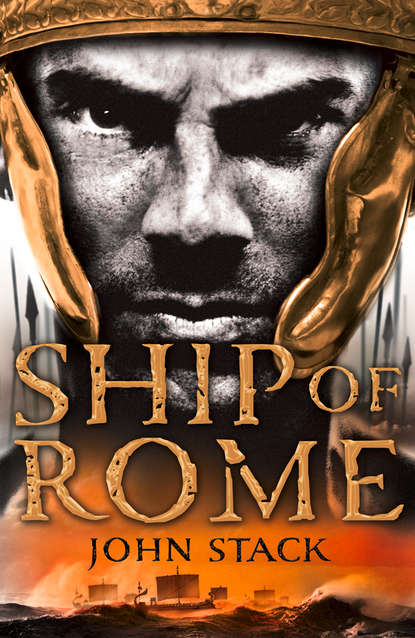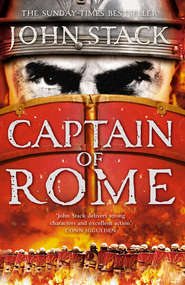По всем вопросам обращайтесь на: info@litportal.ru
(©) 2003-2024.
✖
Ship of Rome
Автор
Год написания книги
2019
Настройки чтения
Размер шрифта
Высота строк
Поля
Gisco made a silent promise to the gods that one day he would hunt down that ship and have his revenge on all who sailed on her.
CHAPTER TWO (#ulink_aee87969-4c38-58cd-8e2a-549852e121e1)
The sail billowed out with a crack as the trailing wind filled the broad canvas sheet, the running rigging straining against the pull. Within an instant the Aquila was propelled to fifteen knots, its cutwater tearing through the sea, throwing a spray of water across the foredeck. The running of a galley required immense skill and concentration, and Atticus noticed the iron look on Gaius’s face as he fought to keep the helm true. One slip and the galley’s stern would swing through the line of the wind. The sail would be exposed to unequal stresses, instantly snapping the rigging and collapsing the canvas. Worse still, if the rigging held, the galley would capsize under the press of wind.
Atticus watched in silence as the experienced helmsman struck a delicate balance between the prevailing wind and the ship, making the two connect until the galley perfectly matched the wind’s speed and direction. Confident that Gaius had the ship in hand, Atticus looked out over the stern rail to confirm the Carthaginians were not in pursuit. The Aquila was now four hundred yards clear of the headland at the northeastern tip of Sicily. The Punici had not followed beyond the strait.
Atticus was in turmoil as he realized his ship had escaped. Although he had known the only choice had been to flee from the enemy fleet, the retreat from the Carthaginian galley marked the first time in his whole life that he had run from an enemy. The empty sea behind the Aquila mocked the captain for its absence of an enemy and Atticus slammed his fist onto the stern rail. Knowing he had made the right decision was not enough to assuage the dishonour he felt at having fled.
Septimus stood silently by Atticus’s side. Eight marines were unaccounted for from the fight on board the enemy galley, six of them hastati, junior soldiers, many of them in their first battle. He could only pray that all had died under the sword and that none had been left injured on the enemy’s deck. If taken alive their fate would be horrific. The Aquila had been saved because of the sacrifice of those men. Septimus recounted their names silently in his mind.
‘Where are we sailing to?’ he asked finally.
‘To the only port Rome holds on the north coast. To Brolium.’
Septimus nodded, looking ahead over the bow. During his time on the Aquila he had come to accept that the unfamiliar seas around him held many enemies, as had the unfamiliar terrain of Sicily when he had served in the legions. As a legionary he was always confident that he served in the best land army in the world. The sight of the Carthaginian fleet had made him realize that Rome did not enjoy that same superiority and confidence at sea.
Eight hours later the Aquila rounded the eastern headland guarding the approaches to the Roman-held port of Brolium. Atticus stood alone on the bow, preferring solitude as the hours had sped past and league after league fell under the galley’s wake. His thoughts had ranged over every detail of the Carthaginian ships they had fought, every difference, however minute, between them and the vessel under his feet, his mind slowly forming a model of the heavier, stronger galleys that would soon plague the waters off northern Sicily.
A sudden change in the tilt of the deck broke Atticus’s thoughts as Gaius lined up the Aquila to strike the very centre of the hectic waters ahead, crammed with transport barges awaiting a chance to disgorge their contents onto the already crowded docks of the once-quiet fishing town. Even from this distance out, the air around Atticus was filled with the hum of voices from the multitude at work, broken occasionally by the sound of a whip crack as a driver spurred his team of oxen to advance, signalling the departure of yet another fully loaded wagon along the road south to the fortified legion encampment hidden beyond the town.
The scene of docking and departing barges, of unloading and reloading supplies, of man and beast struggling for space on the congested docks seemed completely chaotic, and yet Atticus could sense the underlying order that permeated the entire operation as no voice was raised in anger and everywhere men moved with purpose and intent. The Roman legions had never fought a campaign off the mainland before Sicily, and yet, within a matter of months, the Romans’ ability to bring order and discipline to all endeavours ensured that the legions were operating as if they were but a mile from the city of Rome itself. Atticus could only wonder if any natural barrier would ever exist that could protect a people against the seemingly relentless advance of Rome.
Lucius’s sharp commands cut through the cacophony as the sail was collapsed and made secure and the oars were engaged in the rapidly dwindling sea room of the inner harbour. Again Gaius’s incredible skill was called upon as barge after barge was avoided, their crews shouting warnings and curses as each near collision with the slow, ponderous vessels was averted. Atticus’s gaze swept the dock, searching for an opportunity. He quickly saw one and calculated the angles. It would be tight.
‘Three points starboard!’ he roared, his voice acknowledged by Gaius sixty yards away with a nod and a nimble touch on the tiller as Atticus ran to the main deck to prepare to disembark.
The Aquila aligned her bow with an emerging gap as a barge began to cast off, her now empty hull turning towards the mid-channel. Voices and hands were raised on the docks, calling forward the next waiting barge into the valuable space before one of the taskmasters noticed the Aquila’s intercept course, his realization causing a minor panic as the galley’s unerring intent became apparent. Lucius roared for the barge to give way, his command instinctively followed by the merchantmen of the transport vessel who feared the Aquila’s four-foot bronze ram, and the galley swung deftly into the gap left by the departing barge.
Atticus, Septimus and a detachment of six legionaries ran down the gangway the moment it touched the dock, their determined arrival forestalling any protest from the irate taskmaster.
‘Stand by on station,’ Atticus called to Lucius, who saluted and immediately ordered the gangway raised and the galley to push off from the dock. The six legionaries fell in pairs behind the captain and centurion and together they marched towards the end of the dock, heading to the town beyond. The slave labourers crowding the wharf moved back to allow the armed men to pass; as a knot of them dispersed, Atticus spotted an officer approaching at the head of a contubernia of ten soldiers. He was a tall, gaunt man, determination in his step, his face a mask of fury. Atticus recognized him immediately. He was Aulus, the Brolium harbour master.
‘Who the hell do you think you are?’ Aulus yelled as he moved around the gangway of an unloading barge, shoving his way through the queue of bearers that cut across his path. He checked his step as he recognized the approaching captain, ordering his squad of ten men to halt.
‘Atticus, you Greek dog!’ he smiled. ‘By Jupiter’s balls! What madness is this?’
The two men shook hands, Roman style, each grasping the other’s arm below the elbow.
‘I should have known it was the Aquila; only Gaius could pull off a manoeuvre like that. And Septimus,’ Aulus exclaimed over the captain’s shoulder, ‘still alive, I see.’
Septimus allowed himself a smile at the friendly gibe, knowing Aulus’s dislike of legionaries.
‘We couldn’t wait for clearance, Aulus. We need to see the port commander immediately.’
Aulus was disturbed by the captain’s infectious agitation, something he had never before seen in the young man.
‘Atticus, in Pluto’s name, what’s going on?’ he asked, all trace of humour now gone.
‘Carthaginians, Aulus, a whole fleet of them. At least fifty ships. Bearing north through the Strait of Messina.’
‘A Carthaginian fleet? In these waters? By the gods…’
Instinctively Aulus looked around at the assembled fleet of barges. These vessels and their ability to ply goods between the mainland and Sicily were the key to the entire Roman campaign on the island. But they were slow, ponderous beasts in comparison to galleys. Fifty Carthaginian ships would play merry hell with them.
‘Atticus, this news must reach the legion commanders immediately,’ Aulus said without looking back at the captain, his focus on the barges around him, his mind already picturing their destruction at the hands of the Punici.
‘That’s why I need to speak to the port commander immediately, Aulus. He will be able to speak to the legion commanders directly.’
‘Atticus…Gnaeus Cornelius Scipio is here, in Brolium itself.’
‘The senior consul? Here?’ Atticus asked with disbelief. ‘What’s he doing in Sicily?’
‘He’s here to inspect the legions before the spring campaign,’ Aulus replied. ‘He only arrived two days ago. He’s staying in the port commander’s villa.’
Atticus looked up at the villa overlooking the port. It was fifteen minutes away by foot, four minutes by horseback, but that was on a quiet day, when the streets were all but empty. Today the entire town seemed choked with equipment, slaves and draught oxen. He would need the marine legionaries to beat a path to the consul’s door.
‘Septimus,’ he called over his shoulder, ‘we need to get to the villa as quickly as possible.’
‘Understood,’ Septimus replied, and turned to his six men. ‘Squad…draw swords!’ he ordered, his words followed instantly by the distinctive sound of swords being drawn from their scabbards.
All activity around the soldiers ceased as the sound arrested the movement of every man in earshot. Those within range immediately drew back from the group, fearful of the razor-sharp killing sword of the Roman legions. A ripple ran through the crowd as word was passed quickly along the length of the dock and, like a gust of wind blowing through ripened corn, the crowd began to part in front of the soldiers. Septimus turned and slowly drew his own sword, holding it firmly before him, sensing the familiar weight of the weapon, remembering the last time he had drawn it only hours before.
‘Fall in behind,’ he said to Atticus as he looked beyond him to the channel opening before them. ‘Squad…double-quick time.’
The squad took off as one, their pace the ground-eating double-quick time that would get them to their destination, over two miles away, in fifteen minutes. Aulus watched them go until his view of them was lost, the slaves around him returning to work as if nothing had happened. But something had happened, Aulus thought, something had changed. The four legions on Sicily had seemed invincible, unbeatable, the best land army in the world. Now the Carthaginians had begun to exploit their best asset, as masters of the sea, and as surely as death follows life, if the fifty ships of the Punici were not stopped, they would strangle and starve forty thousand of Rome’s finest.
Atticus and Septimus mounted the final steps leading to the villa’s rooftop garden behind two of the consul’s black-cloaked praetorian guards, their long wait before being summoned forward by the guard commander further chafing Atticus’s nerves after his earlier angry exchanges with the praetorian commander in the villa’s courtyard. The praetoriani were notoriously arrogant, their privileged position as the guardsmen of the Senate setting them apart from and above the regular soldiers of the legions, and this particular guard commander, an ex-centurion of the Fourth Legion, had a glaring contempt for all ranks other than his own. He had initially refused the Aquila’s officers’ request for an audience with the consul out of hand, turning his back on them even as they spoke, as if the very effort of refusal was beneath him, and it was only when Atticus mentioned, with barely contained anger, that the entire campaign was now under threat that the guard commander stopped in his tracks to listen before agreeing to seek the consul’s permission for an audience.
Atticus and Septimus stood to attention as the praetorian guards came to a halt just inside the boundary of the garden, their arrival seemingly unnoticed by Gnaeus Cornelius Scipio, senior consul to the Senate of Rome, who was standing with his back to them, slowly and methodically splashing cold water from a basin onto his forearms and face. He reached out for a towel and one was immediately proffered by a large Nubian slave before he turned to face the two officers.
Atticus and Septimus saluted in unison, but the consul did not acknowledge the gesture as he poured himself a glass of wine, the pause giving Atticus a chance to study the man before him. He knew Scipio was a patrician, one of the elite of the Roman Republic, and his bearing showed all the hallmarks of a privileged upbringing. He was not a tall man, maybe two inches shy of six feet, but his stance gave the impression that he stood over everyone around him. He moved like a fighter, with long, slow, fluid movements that belied his obvious strength, and although his eyes were downturned, Atticus had the impression that he was fully aware of everyone around him. The consul looked up to face the two men, his eyes never leaving them as he took a drink from his glass, and both Atticus and Septimus knew that they were being assessed by one of the most powerful men in the Republic.
‘Report,’ he ordered.
‘I am Captain Atticus Milonius Perennis and this is Centurion Septimus Laetonius Capito of the marines. We are the commanding officers of the trireme Aquila out of the port of Locri, stationed in the Ionian Sea and Strait of Messina. This morning—’
‘Wait,’ Scipio interrupted. ‘I am familiar with the family name Laetonius,’ he said with a nod to Septimus, ‘but I have never heard of Milonius. What is the origin of your family?’
‘It’s Greek,’ Atticus replied, somewhat puzzled at the line of questioning, ‘from Brutium,’ indicating the region occupying the ‘toe’ of the Italian mainland.
‘So what is a Greek doing commanding a Roman vessel?’ the consul enquired, trying to gauge the young captain before him. He knew that many of the ships of the Roman navy were provided by provincial cities and so their crews were a mix of personnel from all corners of the Republic, but he had thought all the galleys were commanded by Roman citizens.
‘The origin of the name is Greek, but we are of Brutium, and citizens of the Republic. I joined the navy when I was fourteen and worked my way up to the rank of captain.’
Atticus had drawn himself to his full height as he spoke, and Scipio could sense the pride and determination behind the words when he spoke of his citizenship and rank. He recalled that Brutium had once been part of Magna Graecia, Greater Greece, a loose confederation of city-states whose founders had originated from the Greek mainland. Rome had absorbed the entire area less than a generation before as the legions washed the stain of Pyrrhus from the peninsula, and so now former enemies had become fellow citizens.
‘Continue with your report, Captain,’ Scipio said with a wave of his hand, his mind now tinged with a hint of mistrust as the Greek continued.









